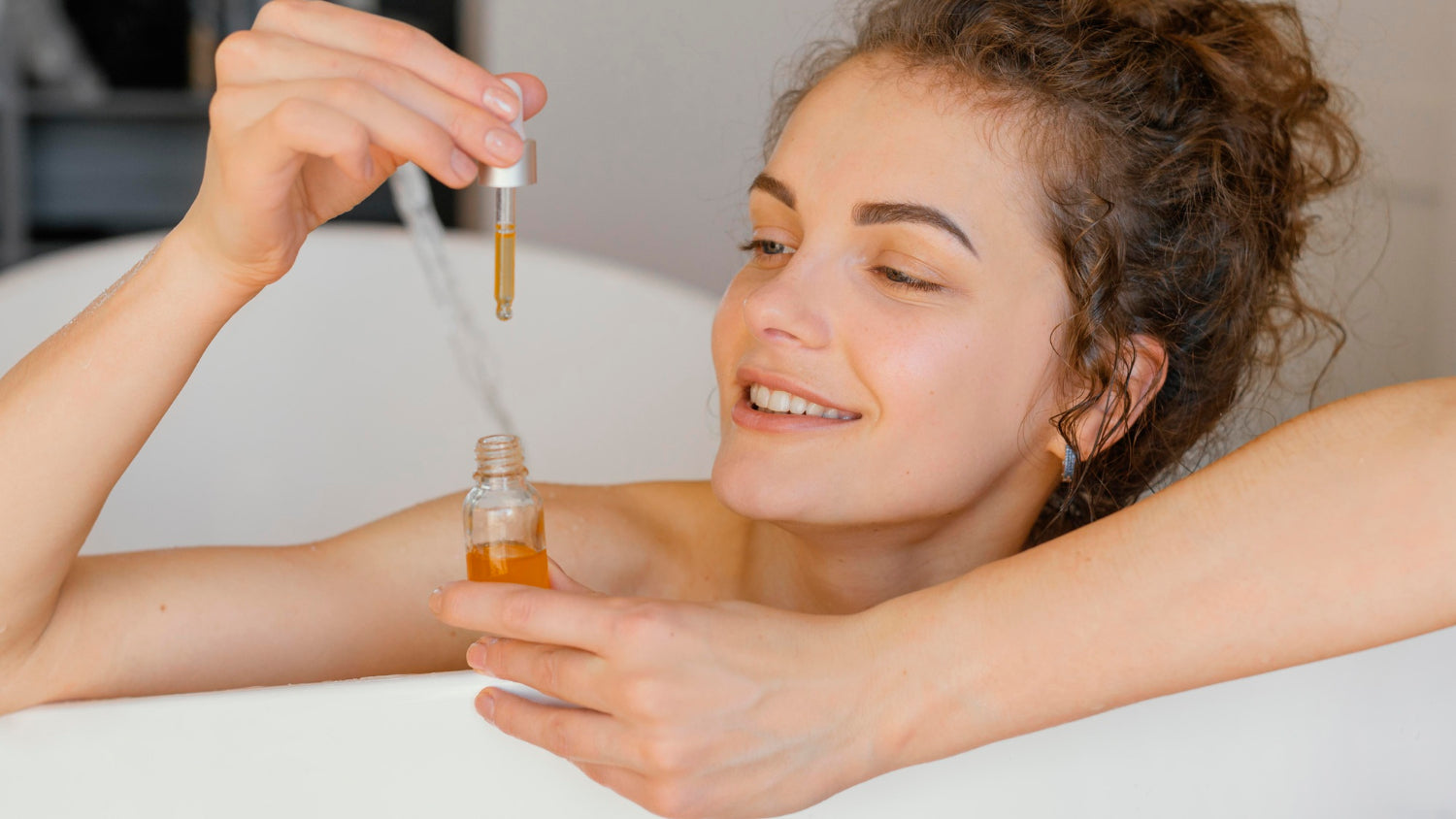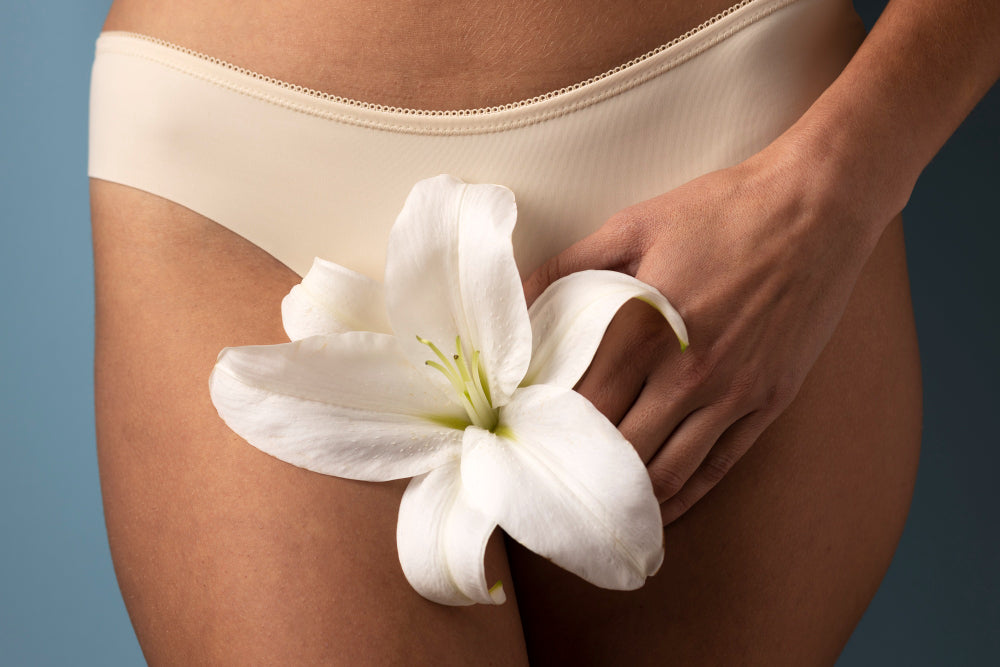Did you know turmeric may also benefit your skin in many ways? I will unveil the whitening and healing powers of turmeric in skincare. According to a study, turmeric may reduce hyperpigmentation, acne, and signs of aging through its antioxidant and anti-inflammatory effects.
Turmeric is a herb with anti-inflammatory, antioxidant & skin-enhancing properties. It may help improve skin glow, heal wounds, treat acne & scars, reduce signs of aging, and manage various skin conditions. Turmeric may be applied topically as a mask, cream, or oil or taken orally as a supplement.
You will find some easy and effective DIY recipes to make your turmeric-based skincare products at home. Don’t miss this opportunity to learn more about this unique spice and how it may benefit your skin. Keep reading!
What Is Turmeric And Why Is It Good For Your Skin?
Many people struggle with various skin issues that affect their appearance and confidence. Common skin problems include acne, dark spots, dryness, inflammation, eczema, psoriasis, and wrinkles. Learn the different types of wrinkles here. Various factors, such as genetics, hormones, stress, pollution, diet, and aging, may cause these skin conditions. They may also be challenging to treat, especially with harsh chemicals that may irritate or damage the skin further.
Suppose you look for a natural way to improve your skin's appearance and health. Turmeric is a spice used for centuries in India and other parts of Asia for its culinary and medicinal benefits.
Find 10 health benefits of turmeric and curcumin here. But did you know turmeric may also benefit your skin in many ways? Turmeric contains curcumin, a bioactive compound with anti-inflammatory, antioxidant, and antimicrobial properties. These properties may help your skin fight acne, pigmentation, aging, eczema, and more.
One of the easiest and safest ways to use turmeric on your skin is to use products that contain turmeric as an ingredient. For example, you may try Neutriherbs Vitamin C Turmeric Exfoliating Glow Facial Scrub, which gently exfoliates your skin and reveals a brighter and smoother complexion. You may also try Neutriherbs Turmeric Soap for Face & Body, which may cleanse and lighten your skin tone.

Global Varieties of Turmeric that You Can Find in The Market
Turmeric has been used for centuries in Ayurveda and traditional medicine for its healing and beautifying properties. However, not all turmeric varieties are created equal. Some have higher curcumin content, some have deeper color, and some have more robust flavor and aroma. Here are some of the global varieties of turmeric that you may find in the market and how they differ from each other.
Indian turmeric:
India is the world's largest producer, consumer, and exporter. The two main types consumed worldwide are 'Madras' and 'Allepy,' named after India's production regions. Madras turmeric has a light yellow color and a mild flavor and aroma. It has a curcumin percentage of 3%, which is lower than the other types. Find more different Indian turmeric varieties and which one is the best here. It is mainly used for culinary purposes, as it may blend well with different spices and ingredients. Allepy turmeric has a deep orange color and a strong flavor and aroma. It has a curcumin percentage of 5%, which is higher than the average. People widely use it for coloring and flavoring dishes and making medicines and home remedies.
Thai turmeric:
Thailand is another major producer and exporter of turmeric worldwide. Thai turmeric has a bright yellow color and a mild flavor and aroma. It has a curcumin percentage of 3-4%, similar to the average. It is mainly used for culinary purposes, especially in Thai cuisine, as it may add a subtle flavor and color to dishes. Thai turmeric is also known for its medicinal properties, as it may help with digestion, inflammation, and skin problems.
Indonesian turmeric:
Indonesia is a country that has a rich diversity of turmeric varieties with different names, colors, and uses. One of the most popular types is 'Temulawak,' which has a brownish-yellow color and a bitter flavor and aroma. It has a 2-3% curcumin percentage, lower than the average. It is mainly used for medicinal purposes, as it helps with liver problems, diabetes, and arthritis. Another type is 'Kunyit,' which has a bright yellow color, mild flavor, and aroma. It has a curcumin percentage of 3-4%, similar to the average. It is mainly used for culinary purposes, especially in Indonesian cuisine, as it adds a distinctive flavor and color to dishes.
Find our best Neutriherbs facial oil with vitamin C, rosehip & jojoba for glowing skin here,
Peruvian turmeric:
Peru is a country that has a unique type of turmeric, which is also known as 'Zedoaria' or 'White Turmeric.' It has a white color and a spicy flavor and aroma. It has a curcumin percentage of less than 1%, much lower than the other types. It is mainly used for medicinal purposes, as it may help with menstrual problems, stomach ulcers, and infections.
These are some of the global varieties of turmeric that you may find in the market and how they differ from each other. Depending on your preference and needs, you may choose the best type of turmeric for your skin and health. However, you may also buy ready-made turmeric products to save time and hassle.

The Benefits of Turmeric for Skin Whitening and Brightening
In the skincare world, where every ingredient is a potential hero, Turmeric emerges as the dazzling protagonist, armed with unmatched whitening and healing powers. As we delve into the radiant realm of this golden spice, prepare to be captivated by the following benefits:
Radiant Complexion:
Turmeric is your ticket to a luminous complexion. Its natural skin-brightening properties work like a spotlight, unveiling your inner glow and bidding farewell to dullness. Embrace the radiance, for your skin deserves to shine!
Hyperpigmentation's Nemesis:
Dark spots and uneven skin tone meet your match. Turmeric is a maestro in fading hyperpigmentation, leaving your skin with a harmonious, even-toned melody. It's time to say goodbye to blotchy and hello to beautifully balanced.
Healing Emissary:
Turmeric is not just a pretty face; it's a healing wizard, too. Its anti-inflammatory prowess soothes irritated skin, making it a godsend for those battling acne or redness. Let Turmeric be the calm in your skincare storm.
Youthful Renewal:
Bid farewell to fine lines and wrinkles; Turmeric is here to rewind the clock. Packed with antioxidants, it helps defy aging by reducing the appearance of lines, giving you that timeless allure. It's like a spa day for your skin without leaving your bathroom.
Complexion Perfection:
Turmeric is a multitasking marvel addressing various skin concerns. From acne scars to blemishes, it's like a superhero swooping in to save the day, making your skin flawless.
Scar Fader:
Turmeric's healing touch extends to scars, gently fading their appearance over time. Whether it's from acne or a minor mishap, let Turmeric be the artist that transforms imperfections into stories of resilience.
UV Guardian:
Shield your skin from the sun's harsh rays with Turmeric's natural sunblock properties. While it's no substitute for SPF, incorporating Turmeric into your routine adds an extra layer of defense, ensuring your skin remains guarded against environmental stressors.

How Turmeric May Whiten And Brighten Your Skin Tone
Try turmeric if you want a natural way to whiten and brighten your skin tone. But how may turmeric help you achieve a flawless complexion? Let me tell you.
Turmeric contains a bioactive compound called curcumin, which has powerful antioxidant and anti-inflammatory effects. Antioxidants may protect your skin from free radical damage, which may cause dullness, unevenness, and hyperpigmentation. Anti-inflammatory agents may reduce redness, swelling, and irritation, affecting skin tone. Learn more details on the importance of antioxidants for aging here.
Turmeric helps you fade dark spots, blemishes, and scars, revealing a more even and radiant skin tone. Turmeric may also inhibit melanin production, the pigment that gives your skin color. Excess melanin may lead to dark patches, especially in areas exposed to the sun. Turmeric helps lighten these areas and prevent further discoloration.
There are many ways to use turmeric on your skin, depending on your preference and skin type. You may make turmeric masks, scrubs, creams, or serums at home using natural ingredients like honey, yogurt, lemon, milk, or aloe vera. You may also buy ready-made turmeric products, such as Neutriherbs Vitamin C Turmeric Exfoliating Glow Facial Scrub, which may gently exfoliate your skin and reveal a brighter and smoother complexion.
Check our top selection of Neutriherbs vitamin C brightening & glow trio here.
Turmeric is a spice that may whiten and brighten your skin tone with its antioxidant and anti-inflammatory properties. It may help reduce hyperpigmentation, acne, and aging signs and improve skin elasticity, brightness, and texture. Turmeric may be used in various ways in skincare, such as masks, scrubs, creams, and serums. You may also take turmeric orally to boost your overall health and wellness. Turmeric is a spice that may spice up your skin and your life. So, what are you waiting for? Try it today and see the difference for yourself.
How Turmeric Can Fight Acne and Prevent Breakouts
If you are struggling with acne and breakouts, you are not alone. Acne is a common skin condition affecting millions of people worldwide. Various factors, such as hormones, stress, diet, genetics, and bacteria, may cause it.
But don't worry; turmeric is a natural and effective way to combat acne and prevent breakouts. Yes, you heard me right. The same spice that gives curry its yellow color and delicious flavor may also help you achieve clear and healthy skin.
Turmeric has excellent anti-inflammatory and antibacterial properties that may help fight acne and prevent breakouts. Here's how:
Turmeric may kill the bacteria that cause acne:
Propionibacterium acnes (P. acnes) often triggers acne by overgrowing on the skin and feeding on sebum, the oil produced by the sebaceous glands. When the pores get clogged with sebum, dead skin cells, and dirt, P. acnes may multiply and cause inflammation, infection, and pus formation.
Turmeric may reduce the inflammation that leads to acne:
Inflammation is the body's natural response to injury or infection, but it may also cause redness, swelling, pain, and scarring. Turmeric contains curcumin, a powerful anti-inflammatory compound that may inhibit the production of inflammatory cytokines, such as TNF-alpha and IL-6, which are involved in acne formation.
Turmeric may unclog the pores and regulate sebum production:
Sebum is essential for moisturizing and protecting the skin, but too much may lead to oily skin, enlarged pores, and acne. Turmeric may help balance sebum production by modulating the activity of 5-alpha reductase, an enzyme that converts testosterone to dihydrotestosterone (DHT), a hormone that stimulates sebum secretion.
As you may see, turmeric may help you fight acne and prevent breakouts by targeting the root causes of the problem. It may also heal acne scars and blemishes by stimulating skin regeneration and fading discoloration.

How Turmeric Can Smooth Fine Lines and Wrinkles
One of the most common signs of aging is the appearance of fine lines and wrinkles on the skin. The loss of collagen and elastin, the proteins that provide structure and elasticity to the skin, causes these. As we age, our skin becomes thinner, drier, and less able to retain moisture and repair itself.
Turmeric has excellent anti-aging properties that may help smooth fine lines and wrinkles. Here's how:
- Turmeric may increase blood circulation to the skin. Blood carries oxygen and nutrients to the skin cells, essential for their health and function. Applying turmeric stimulates blood flow to the skin, improving its texture, tone, and glow.
- Turmeric may enhance skin hydration and moisture. Hydration is the key to keeping the skin plump and supple, which may prevent and reduce the appearance of fine lines and wrinkles. Turmeric may help hydrate the skin by attracting and retaining water molecules and increasing the production of hyaluronic acid. This natural moisturizer may hold up to 1000 times its weight in water.
- Turmeric may stimulate collagen synthesis and protect against collagen degradation. Collagen is the most abundant protein in the skin, responsible for its strength and firmness. As we age, collagen production declines and collagen fibers become damaged by free radicals, UV rays, and other environmental factors. Turmeric may help boost collagen production by activating the fibroblasts, which produce collagen. It may also protect collagen from damage by neutralizing free radicals, inhibiting the enzyme MMP-1, which breaks down collagen, and blocking the expression of NF-kB. This protein triggers inflammation and collagen loss.
Find our amazing Neutriherbs 4D hyaluronic acid gel moisturizer here.
How to Use Turmeric for Skin Whitening and Brightening
You may have heard of the excellent benefits of turmeric for skin whitening and brightening, but how may you use it for your skin? There are two ways: make your DIY turmeric face mask or use Neutriherbs turmeric face product. Both methods are practical and easy to operate.
To make a turmeric face mask, you need some turmeric powder, honey, and yogurt. These ingredients are natural and gentle on your skin, and they may help lighten dark spots, fight acne, and smooth fine lines and wrinkles.
Here is how to make and use your DIY turmeric face mask:
- Mix 1 teaspoon of turmeric powder, 2 teaspoons of honey, and 1 tablespoon of yogurt in a small bowl. Depending on your skin type and needs, add other ingredients, such as lemon juice, oatmeal, or aloe vera. Learn top skincare ingredient suggestions for all skin types here.
- Apply the mask evenly on your clean and dry face, avoiding the eye area. Leave it on for 15 to 20 minutes, then rinse it with lukewarm water. Pat your skin dry and apply your favorite moisturizer.
- Repeat this mask once or twice a week for best results. Be careful not to stain your clothes or towels with turmeric, as it may be hard to remove. You may also use a mild cleanser to remove any yellow residue from your skin.
If you want to use Neutriherbs turmeric face serum, you don't need to worry about mixing or staining anything. This ready-made serum contains turmeric extract, vitamin C, hyaluronic acid, and niacinamide. These ingredients combine to brighten, hydrate, and nourish your skin while reducing inflammation, redness, and irritation.

How To Use Turmeric In Your Skincare Routine
Turmeric may help you achieve a radiant, clear, youthful complexion, but you must use it correctly and safely. Here are some tips on how to use turmeric in your skincare routine.
- Choose the right product. You may use turmeric in various forms, such as powder, paste, oil, or cream. You may also make your DIY turmeric masks, scrubs, or serums at home using natural ingredients like honey, yogurt, lemon, milk, or aloe vera. However, you may also buy ready-made turmeric products to save time and hassle. For example, you may try Neutriherbs Vitamin C Turmeric Exfoliating Glow Facial Scrub, which gently exfoliates your skin and reveals a brighter and smoother complexion. You may also try Neutriherbs Turmeric Soap for Face & Body, which may cleanse and lighten your skin tone.
- Use it sparingly. Turmeric is a potent ingredient that may stain your skin or clothes, so you must use it sparingly and wash it off thoroughly. A little goes a long way, so you don't need too much turmeric to see the results. You may also mix turmeric with other ingredients that may dilute its color, such as milk, yogurt, or coconut oil.
- Do a patch test. Turmeric may cause allergic reactions, especially if you have sensitive skin. Before you apply turmeric to your face, you should do a patch test on your inner arm or behind your ear. If you notice any redness, itching, burning, or swelling, you should avoid using turmeric on your skin. You should consult your doctor before using turmeric if you have any medical conditions or take any medications, as turmeric may interact with certain drugs.
- Use it regularly. Turmeric may benefit your skin, but you must use it regularly to see the best results. You may use turmeric once or twice a week, depending on your skin type and needs. You may also take turmeric orally to boost your overall health and wellness, as turmeric may help with inflammation, digestion, immunity, and more. However, it would help if you stayed within the recommended daily dosage of about 500 mg of curcumin.
Turmeric is a spice that may spice up your skin and your life. You may enjoy its whitening, healing, and anti-aging powers in your skincare routine. Turmeric may also improve your skin's elasticity, brightness, and texture. Turmeric may be utilized in various ways in skincare, such as masks, scrubs, creams, and serums.

Tips and Precautions for Using Turmeric on Your Skin
Turmeric is an excellent ingredient for your skin, but it also has some tips and precautions you should know before using it. Here are some of them:
- Do a patch test before applying turmeric to your face. Turmeric is generally safe and gentle on the skin, but some people may have allergic reactions or sensitivity. To avoid any adverse effects, do a patch test on a small area of your skin, such as your wrist or behind your ear, and wait 24 hours. Do not use turmeric on your face if you notice any redness, itching, burning, or swelling.
- Avoid using turmeric if you have gallbladder problems, bleeding disorders, or diabetes. Turmeric may interfere with some medications and conditions, such as blood thinners, anticoagulants, and anti-diabetic drugs. It may also worsen gallbladder issues, such as gallstones or bile duct obstruction. If you have any of these conditions, consult your doctor before using turmeric on your skin.
- Be careful not to stain your clothes or towels with turmeric. Turmeric has an intense color that may stain fabrics, especially white ones. Wear old clothes and use dark-colored towels to prevent this when applying turmeric on your skin. You may also cover your hair with a shower cap or a bandana to avoid staining your hair.
Find our best Neutriherbs pro-retinol anti-aging facial toner here.
- Use a mild cleanser to remove any yellow residue from your skin. Turmeric may leave a yellow tint on your skin, especially if you have fair or light skin. To remove this, use a mild cleanser or a gentle scrub to wash your face after using turmeric. You may also use a toner or a cotton pad soaked in milk to wipe off any remaining traces of turmeric.
- Use sunscreen after using turmeric on your skin. Turmeric may make your skin more sensitive to the sun, which may cause sunburn, hyperpigmentation, or premature aging. To protect your skin from sun damage, always use sunscreen with at least SPF 30 after using turmeric on your skin. You may also wear a hat, sunglasses, or protective clothing to shield your skin from the sun.
These are some tips and precautions for using turmeric on your skin. By following them, you may enjoy the benefits of turmeric for skin whitening and brightening without any risks or side effects.

Conclusion:
Turmeric is a spice that has whitening and healing powers for the skin. It may help reduce hyperpigmentation, acne, and signs of aging by its antioxidant and anti-inflammatory effects. Have you tried turmeric for your skin yet? If not, what are you waiting for?



